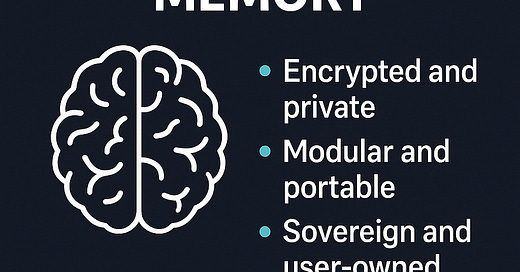I’m an Hourly Active User (HAU) of AI apps. ChatGPT, Claude, Gemini, Perplexity — I’m in all of them, all the time (you probably are too). And yet, every single chat treats me like a stranger.Same tools. Same models. Same dance — stuck on a first date that never ends. The problem isn’t intelligence. It’s memory. Not token limits. Not scroll-up history. I mean real memory. Long-term, portable, personal memory.
Big Tech will offer infinite memory next. But it’ll be a lock-in tactic. We need this layer to be open, sovereign, and user-owned.
I don’t want a hundred context engines.
I don’t want to be platform-loyal out of sunk-cost guilt.
I just want to stop going on first dates with my own data.
ChatGPT: Remembering Within Walls
OpenAI recently upgraded ChatGPT's memory capabilities, enabling it to "reference all of your past chats to provide more personalized responses."
It now learns your preferences, tone, and working style — creating a surprisingly personal experience within its ecosystem.
The critical limitation?This memory exists exclusively inside OpenAI’s walls.
Your carefully trained memory profile can’t travel with you. It’s trapped.
Claude: Facts Without Flow
Claude, Anthropic’s flagship AI assistant, made substantial memory strides with Claude 4.It can now extract and store key facts to build tacit knowledge over time.
The latest release, Claude Opus 4, introduced true memory persistence, solving what insiders called the “amnesia problem.” In one demo, it worked autonomously for seven hours on a complex coding project — showing unprecedented continuity.
Still, Claude struggles with cross-thread coherence.
It remembers facts, but not the flow.
Conversations live in silos, not across sessions.
Gemini: Google-Integrated Memory
Google’s Gemini is deeply integrated with Gmail, Calendar, Photos, and more — using a system internally known as “pcontext” (personalized context).
It can surface suggestions before you ask, tapping into your digital life.
It remembers your preferences, personal details, and work habits.
But almost entirely within the Googleverse.
Perplexity: Research Without Retention
Perplexity AI is exceptional at research. Its Deep Research mode performs dozens of searches and reasons across sources to deliver comprehensive answers.
But memory? Limited.
Currently, Perplexity operates with session-based memory.
It resets with every new conversation — losing context, continuity, and user history.
Beta memory features are in the works for late 2025.
These will begin auto-storing relevant information across threads — but as of now, you start from scratch every time.
The Core Problem: Siloed Memory
Across all these platforms, memory and personalization remain confined within proprietary ecosystems.
No AI system today offers true cross-platform memory transfer.
The result: users who’ve built deep profiles are stuck, facing significant switching costs just to try something new.
Why Platforms Resist Memory Portability
Let’s be honest: this isn’t a technical limitation.It’s a business strategy.
Memory is lock-in.The more context a platform captures, the harder it is for users to leave. This isn’t just a consumer problem. Enterprise leaders are already wary of AI vendor lock-in — just like they were with cloud and CRM platforms before.
Memory walls are the new moats.
The Repetition Tax
Every platform reset? I pay for it.
Re-upload that doc.
Re-contextualize my goals.
Re-explain my writing tone.
Over. And over. Again. This is the repetition tax — and we’re all paying it. It wastes time, tokens, and energy.It turns powerful AI into glorified autocomplete. And it creates one of the biggest hidden costs in today’s AI economy.
The irony? These tools are supposed to save us time.
A Better Memory Stack: Beyond Human Recall
The right memory architecture isn’t a monolith. It’s a layered system:
Basis Knowledge — foundational intelligence: timeless facts, core truths
Logic Memory — rules and behaviors: what to do when
Content Memory — reference and task material: past outputs, documents, structured context
When AI systems coordinate across these layers, they evolve from assistants to collaborators.
The First Platform That Gets Memory Right Will Reshape AI
Because here’s the truth:
The AI revolution won’t be won by whoever builds the smartest model.
It’ll be won by whoever builds the best memory — and gives you ownership of it.
The vault.
The protocol.
The plumbing.
It’s all missing — but I am it’s coming.A memory that travels with me, learns with me, and belongs to me. Because the future of AI isn’t just about intelligence.
It’s about remembrance — and control.




